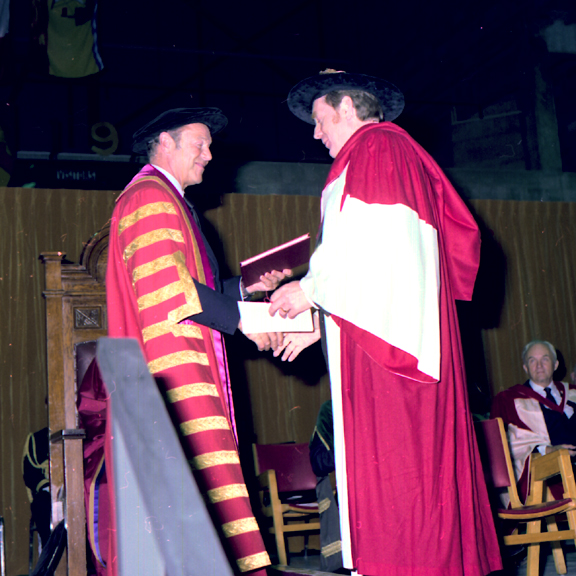1976 Fredericton Convocation
Carter, Wilfred MacKenzie
Doctor of Science (D.Sc.)
Orator: Condon, Thomas J.
Image Caption
L to R: Sir Max Aitken, Wilfred MacKenzie Carter
Second Image Caption
Source: Joe Stone fonds-UA RG340, 1976 (#12555C)
Citation:
CONVOCATION, OCTOBER, 1976
WILFRED MACKENZIE CARTER
to be Doctor of Science
Currently Vice-President and Executive Director of the International Atlantic Salmon Foundation in St. Andrews, Mr. Carter seems to have acquired the tenacity, single-mindedness, and bounding energy of that magnificent species of fish with which he has been associated in so many ways during his lifetime. An honours biology graduate from Mount Allison, he became a fisheries and wild life biologist for his native Province of Quebec after postgraduate studies at McGill University. Drawn almost immediately to the Atlantic salmon which he saw as a model for demonstrating the interdependence of the entire living community, his subsequent assignments have given him increasing prominence in the areas of fisheries management, salmon research, and the preservation and conservation of salmon in Atlantic Canada and the New England States.
Much of his work has been international in scope. In Canada and the United States he adapted the salmon smolt rearing techniques of the eminent Swedish scientist, Dr. Borje Carlin. With Dr. Henry Heyl of Dartmouth he developed new information on the human stress syndrome using the salmon as a model. The North American Salmon Research Centre in St. Andrews, associated with the Huntsman Marine Laboratory, is almost entirely Mr. Carter’s creation, and through its genetics program and Fish Culture Training School there are now high expectations that significant breakthroughs can occur in the exciting new field of aquaculture.
With Mark Twain, Wilf Carter knows that "there is more to going fishing than catching fish." A distinguished career in forging together research and appropriate organizational structures amply attests to his understanding of that truism, for his achievements in promoting collaborative international research programs have been outstanding. From the salmon he has perhaps learned to be patient yet tireless in his pursuit, to be ready with the net yet prepared for many a high leap and a possible upset before the battle is over.
From: Honoris Causa - UA Case 70, Box 2
WILFRED MACKENZIE CARTER
to be Doctor of Science
Currently Vice-President and Executive Director of the International Atlantic Salmon Foundation in St. Andrews, Mr. Carter seems to have acquired the tenacity, single-mindedness, and bounding energy of that magnificent species of fish with which he has been associated in so many ways during his lifetime. An honours biology graduate from Mount Allison, he became a fisheries and wild life biologist for his native Province of Quebec after postgraduate studies at McGill University. Drawn almost immediately to the Atlantic salmon which he saw as a model for demonstrating the interdependence of the entire living community, his subsequent assignments have given him increasing prominence in the areas of fisheries management, salmon research, and the preservation and conservation of salmon in Atlantic Canada and the New England States.
Much of his work has been international in scope. In Canada and the United States he adapted the salmon smolt rearing techniques of the eminent Swedish scientist, Dr. Borje Carlin. With Dr. Henry Heyl of Dartmouth he developed new information on the human stress syndrome using the salmon as a model. The North American Salmon Research Centre in St. Andrews, associated with the Huntsman Marine Laboratory, is almost entirely Mr. Carter’s creation, and through its genetics program and Fish Culture Training School there are now high expectations that significant breakthroughs can occur in the exciting new field of aquaculture.
With Mark Twain, Wilf Carter knows that "there is more to going fishing than catching fish." A distinguished career in forging together research and appropriate organizational structures amply attests to his understanding of that truism, for his achievements in promoting collaborative international research programs have been outstanding. From the salmon he has perhaps learned to be patient yet tireless in his pursuit, to be ready with the net yet prepared for many a high leap and a possible upset before the battle is over.
From: Honoris Causa - UA Case 70, Box 2
Citations may be reproduced for research purposes only. Publication in whole or in part requires written permission from the author.
